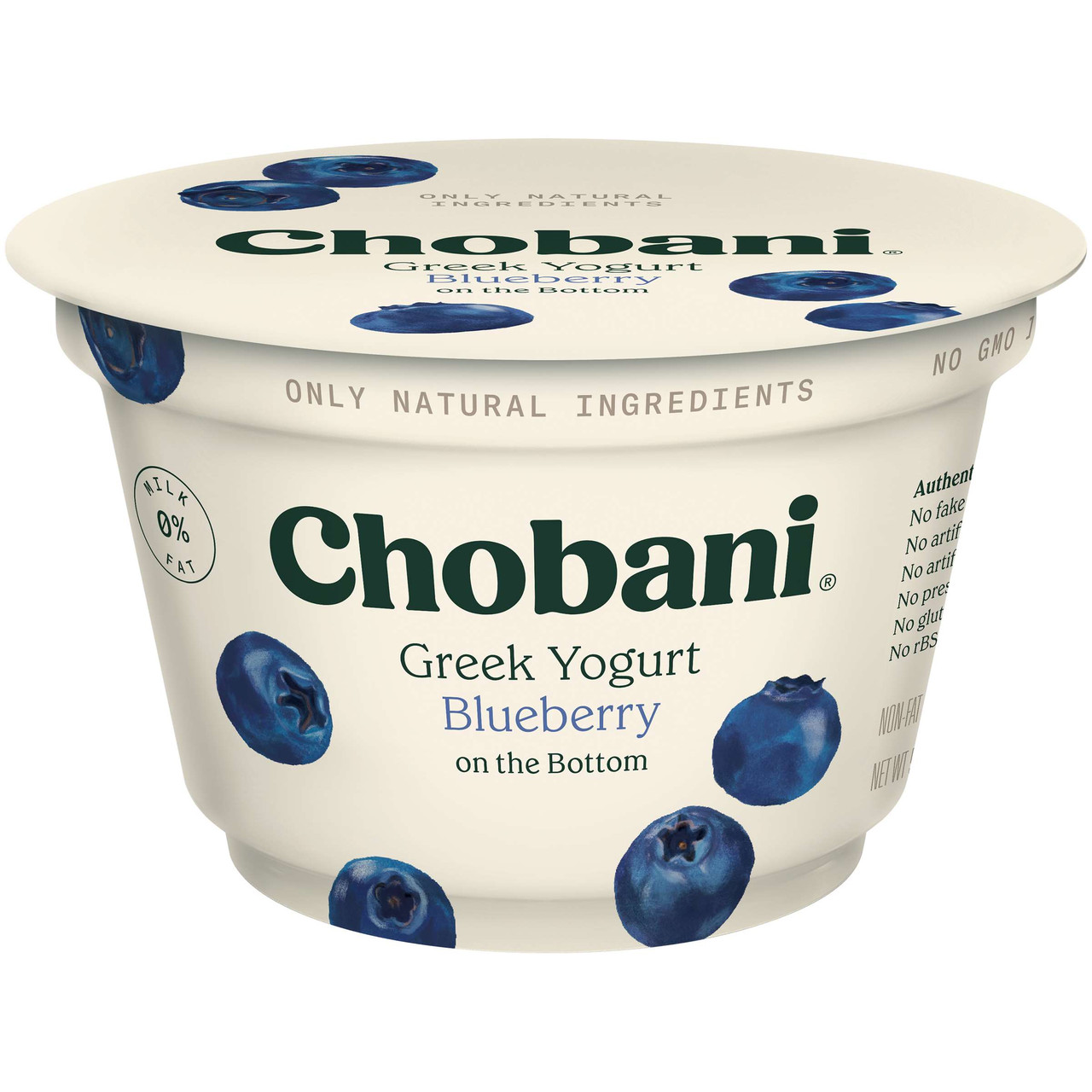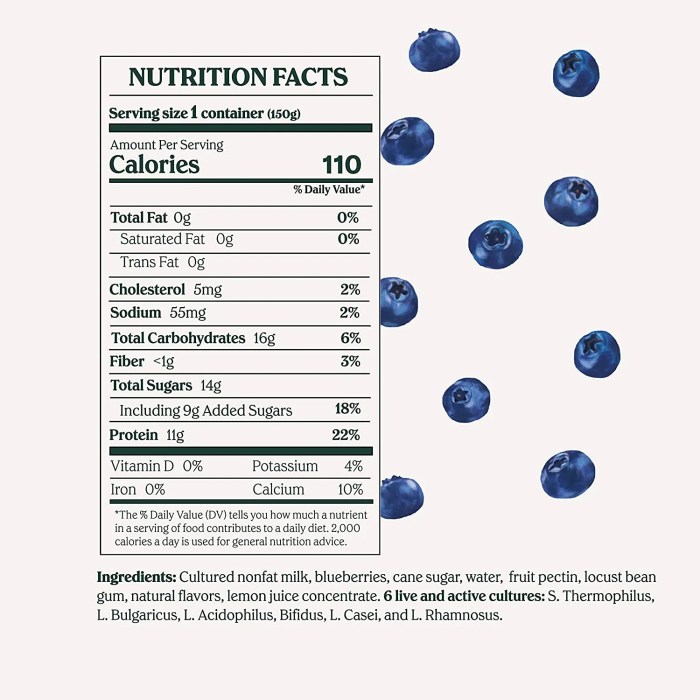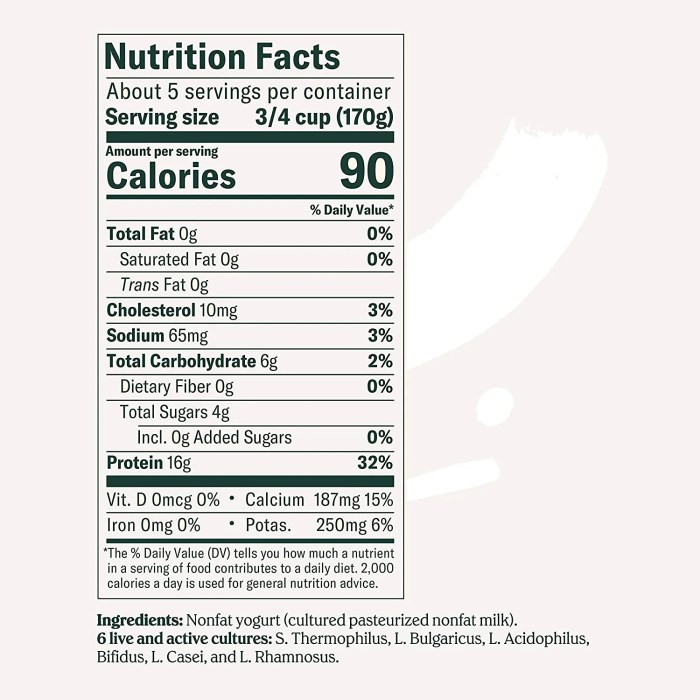Ingredient Analysis

Chobani blueberry yogurt nutrition facts – Chobani blueberry yogurt, like many processed foods, contains a blend of ingredients that contribute to its texture, flavor, and nutritional profile. Understanding these ingredients and their roles is key to making informed dietary choices. This analysis will detail the typical components of Chobani blueberry yogurt, examining their function and potential impact on both nutritional value and taste. We will also identify potential allergens.
Ingredient List and Functions
The ingredient list for Chobani blueberry yogurt typically begins with the primary dairy component, which is usually whole milk or a blend of milk and cream. This provides the creamy texture and contributes significantly to the protein and fat content. The next key ingredient is usually cultured milk, which is the base for the yogurt itself. The bacteria cultures (like
- Lactobacillus bulgaricus* and
- Streptococcus thermophilus*) are responsible for the fermentation process, creating the characteristic tangy flavor and contributing to the yogurt’s probiotic benefits. Sugar is added to enhance sweetness, although the amount varies depending on the specific product. Blueberry puree or concentrate provides the fruit flavor and color. Other ingredients may include modified food starch (a thickening agent), pectin (a natural gelling agent), and natural flavors.
Yo, so I’m checking the Chobani blueberry yogurt nutrition facts, tryna stay healthy, ya know? But then I’m thinking about that Buc-ee’s run I’m planning – gotta check out the Buc-ee’s nutrition facts before I go ham on those beaver nuggets. Anyway, back to the Chobani – those protein levels are pretty fire, right?
Finally, some varieties may contain fruit pieces, and some include added vitamins or minerals.
Allergens
Chobani blueberry yogurt contains dairy, which is a major allergen for many people. While the blueberries themselves are not typically considered major allergens, some individuals might have sensitivities. Always check the product label for a complete list of ingredients and potential allergens, especially if you have any allergies or intolerances. It is crucial to carefully review the label to confirm if there are any potential cross-contaminations with other products processed in the same facility.
Ingredient Categorization
Below is a categorized list of typical ingredients found in Chobani blueberry yogurt:
- Dairy: Whole milk, cultured milk, milk solids (possibly)
- Fruit: Blueberry puree, blueberry concentrate, (possibly blueberry pieces)
- Sweeteners: Sugar (various types like cane sugar or evaporated cane juice are possible)
- Thickening Agents: Modified food starch, pectin
- Flavorings: Natural flavors
- Other: Vitamins (occasionally added), Minerals (occasionally added)
Serving Size and Consumption

Chobani blueberry yogurt, like many other yogurts, comes with a recommended serving size. Understanding this serving size is crucial for accurately tracking your daily nutritional intake and reaping the benefits of this healthy snack or meal component. Proper portion control is key to maintaining a balanced diet and achieving your health goals.The standard serving size for Chobani blueberry yogurt is typically around 5.3 ounces (150 grams), although this can vary slightly depending on the specific product and packaging.
This serving size provides a specific amount of calories, protein, carbohydrates, and fats, as detailed on the nutrition label. Consuming more or less than the recommended serving will proportionally alter the nutritional values. For instance, doubling the serving size will double the calories, protein, and other nutrients. Conversely, halving the serving size will halve these values.
Nutritional Value Changes with Varying Serving Sizes, Chobani blueberry yogurt nutrition facts
The nutritional information provided on the Chobani blueberry yogurt container is based on the standard serving size. Deviation from this serving size directly impacts the total nutritional intake. For example, if the label indicates 150 calories per serving, consuming two servings would result in 300 calories. This principle applies to all the nutrients listed, including protein, fat, carbohydrates, and sugars.
Careful attention to serving size is essential for managing calorie intake and maintaining a balanced diet. Individuals aiming for weight loss or managing specific dietary needs should pay close attention to these changes. For example, someone on a low-sugar diet would need to adjust their consumption accordingly.
Incorporating Chobani Blueberry Yogurt into a Balanced Diet
Chobani blueberry yogurt can be easily integrated into a balanced diet in various ways. It can serve as a healthy breakfast option, a refreshing midday snack, or even a component of a more substantial meal. Its high protein content contributes to satiety, helping to manage hunger and prevent overeating. The probiotics present in yogurt also support gut health, which is increasingly recognized as vital for overall well-being.
Remember to consider the yogurt’s sugar content when planning your meals and snacks, especially if you are monitoring your sugar intake.
Practical Applications of Chobani Blueberry Yogurt
Chobani blueberry yogurt offers versatile applications beyond simply eating it straight from the container. It can be incorporated into various meal preparations. For instance, it can be a delicious addition to smoothies, providing creaminess and a boost of protein. It can also be used as a base for homemade parfaits, layered with granola and fresh berries. Furthermore, it can be a key ingredient in dips for fruits or vegetables, providing a healthy and flavorful alternative to less nutritious options.
A simple breakfast bowl could consist of Chobani blueberry yogurt topped with a sprinkle of nuts and seeds for added texture and nutrients. For a quick and healthy lunch, it could be paired with whole-wheat crackers and some sliced cucumber.
Health Implications and Benefits: Chobani Blueberry Yogurt Nutrition Facts

Chobani blueberry yogurt offers a blend of nutritional components that contribute to overall health and well-being. Its benefits stem primarily from the presence of probiotics, antioxidants, and essential nutrients, although individual responses may vary. Careful consideration should be given to potential interactions with pre-existing health conditions or dietary restrictions.Probiotics and Antioxidants: A Synergistic PartnershipThis section examines the interplay between probiotics and antioxidants in Chobani blueberry yogurt and their impact on health.
The probiotics contribute to a healthy gut microbiome, while the antioxidants from the blueberries combat oxidative stress.
Probiotic Influence on Gut Health
The live and active cultures in Chobani blueberry yogurt, such as
- Lactobacillus* and
- Bifidobacterium* strains, act as probiotics. These beneficial bacteria aid digestion, improve nutrient absorption, and support a balanced gut microbiome. A healthy gut microbiome is increasingly linked to improved immune function, reduced inflammation, and enhanced overall well-being. For instance, studies have shown that individuals with diverse gut microbiomes tend to exhibit better responses to vaccinations and reduced risk of certain chronic diseases.
The specific strains present in Chobani yogurt may vary slightly depending on the production batch. Always check the product label for the most up-to-date information.
Antioxidant Properties of Blueberries
Blueberries are rich in antioxidants, particularly anthocyanins, which are responsible for their vibrant blue color. These antioxidants help protect the body against damage caused by free radicals, unstable molecules that can contribute to aging and various health problems. The antioxidants in blueberries, when combined with the probiotics in yogurt, may offer a synergistic effect, enhancing their individual benefits.
One example of this synergistic effect is the improved absorption of certain nutrients due to a healthier gut microbiome fostered by the probiotics.
Considerations for Specific Dietary Needs
While Chobani blueberry yogurt offers numerous benefits, individuals with specific dietary needs or health conditions should exercise caution. Those with lactose intolerance may experience digestive discomfort, although some lactose-free options are available. Individuals with high blood sugar levels should monitor their intake due to the presence of natural sugars. Furthermore, those on a low-protein diet should be mindful of the protein content.
Always consult with a healthcare professional or registered dietitian before making significant dietary changes, especially if managing a specific health condition.
Impact of Yogurt Consumption on Overall Health
Regular consumption of yogurt, like Chobani blueberry, can contribute positively to several aspects of health. Improved digestion, strengthened immunity, and reduced risk of certain chronic diseases are potential outcomes. For example, studies have shown a correlation between regular yogurt consumption and a reduced risk of type 2 diabetes and cardiovascular disease. However, it’s crucial to remember that yogurt is just one component of a balanced diet and healthy lifestyle.
It should not be viewed as a standalone solution for all health problems. A holistic approach encompassing regular exercise, stress management, and adequate sleep is essential for optimal well-being.
Health Benefits and Considerations Summary
Chobani blueberry yogurt offers potential health benefits through its probiotic and antioxidant content, contributing to improved gut health and reduced oxidative stress. However, individuals with lactose intolerance, blood sugar concerns, or specific dietary restrictions should consider their intake carefully. As part of a balanced diet and healthy lifestyle, yogurt can positively influence overall health, but it shouldn’t be considered a magic bullet.
Always prioritize a holistic approach to well-being.
General Inquiries
Is Chobani blueberry yogurt a good source of calcium?
Yes, it’s a decent source of calcium, contributing to healthy bones and teeth. The exact amount varies slightly depending on the specific product and serving size, so check the nutrition label.
Does Chobani blueberry yogurt contain artificial sweeteners?
No, Chobani generally avoids artificial sweeteners. However, always check the ingredient list on the specific product you’re buying, as formulations can change.
How much protein is in a serving of Chobani blueberry yogurt?
The protein content varies slightly depending on the specific product, but generally, a serving provides a good amount of protein to support muscle growth and repair. Check the nutrition label for the precise amount.
Can I freeze Chobani blueberry yogurt?
Yes, you can freeze Chobani blueberry yogurt, but keep in mind that the texture might change slightly upon thawing. It’s best to freeze it in individual portions for easier management.
